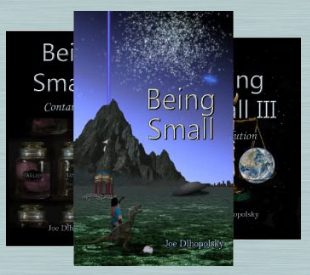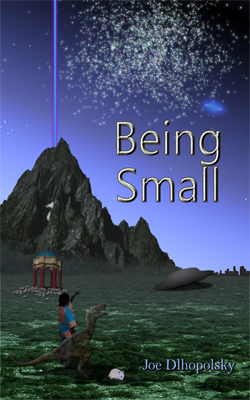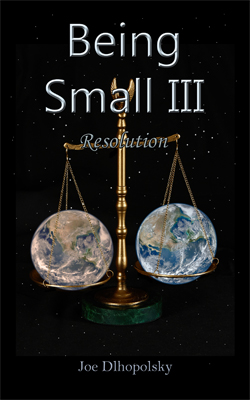
|
The Being Small trilogy narrates a journey by four people to a distant star system that has extended an apparent invitation to visit and has provided the means to do so. Initially funded by Scanodyne, an American tech corporation, the US government takes over the mission. However, all is not what it seems. There was a hidden purpose for the selection of the mission leader. Problems begin weeks into the voyage and the crew are left uncertain as to whether they will reach their destination or travel endlessly through uncharted space with no way to get home. The trilogy centers around Sandor Tatrin, the mission commander, a former US Navy officer who had a middling career due to his unfortunate tendency to question the decisions of his superiors. The consequences of the hidden reason for his selection run through all three novels. Human destiny, how we treat our own, and how we neglect our only home are ongoing themes. The other crew members are a scientist, a soldier, and the CEO of the Scanodyne Corporation who insisted on being in the crew before ceding control of the project to the government. Book II addresses the Earth-bound reaction to the mission that was detailed in the first book. Book III brings the narrative to a conclusion. Yes, this is a "first contact" story. But it's not like others that have preceded it. It focuses in detail on the various implications of the first contact. It goes against the idea that advanced civilizations are inscrutable and so far above us that we'll never understand them. Although they may be advanced, the trilogy fleshes them out; they have goals and individuals have personalities. Why did the creatures the humans first named the Pisceans extend their invitation? The answer to that question and more will become clear to the reader. |

|
This is a Scientists at a private corporation, Scanodyne Industries, decode an encrypted alien transmission that contains an invitation to visit with instructions for the technology bring it about. The U.S. government gets wind of Scanodyne’s plan and takes over the project. Limited to a crew size of four, the captain’s role is assigned in a murky manner to Sandor Tatrin, a Navy officer with an up-and-down career, currently in the down direction, and who, without knowing it, holds a secret that can affect events on Earth. He selects a scientist and a security expert for his crew. The fourth member is mandated as part of the agreement that surrendered the project to the government: the CEO of Scanodyne. The key players have different motivations that go beyond a simple mission of exploration and discovery. Complications arise en route on their ship Hokule'a and don’t stop there. Do the humans find what they’re looking for? You’ll have to read the book to find out. |

|
Rather than ushering in an era of human progress, a major consequence of the first mission to an alien civilization described in Book I unleashes the wrath of powerful U.S. government leaders. Volume II of Being Small describes efforts by those individuals to marginalize and discredit Sandor Tatrin who had become the sole focus of the existential threat to their interests, ambitions, and even their careers. They weaponize his discoveries in an effort to turn popular opinion against him. Being Small – Containment tells this story. It introduces new characters and describes the paths taken by the crew of Hokule'a after they return. And what of the aliens? Do they have a presence? Are they benign or are they the threat that some would claim as part of the effort to discredit Tatrin and his mission? What would be their evaluation of homo sapiens? |

|
Book II was a classic second act. You know, where everything goes wrong and the central question becomes: will it work out for our heroes? Will it be a Greek tragedy or will it be something uplifting? The Being Small – Resolution book cover hints at the themes explored: an Earth in precarious balance in the never-ending conflict between those who seek order, knowledge, and egalitarianism and those who are driven by the lust for power and riches and who will step on the unfortunate (those among us who are made to feel small) to achieve their ends. The novel explores the outcome of the monkey wrench thrown into the machinery at the end of the second book. It continues and brings to a conclusion the paths traveled by Sandor Tatrin, Naomi Hargraves, Tony Scott, and Dirk Cosgrove – the four travelers who participated in the initial leap into the unknown in Book I. And what of Ingrid Sorensen, E. James Atkinson III, and Vice-President Link? Readers of the first two books will want to learn of their fates. Sharply defined new characters, each with his or her own story, contribute to the narrative. Is the ending uplifting or devastating? |
